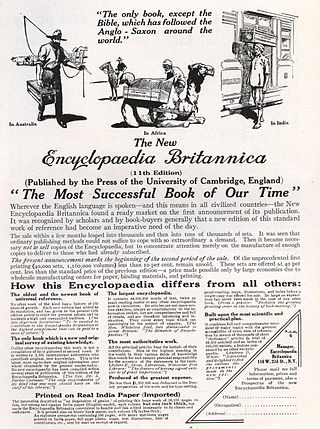
The Encyclopædia Britannica is a general knowledge English-language encyclopaedia. It has been published by Encyclopædia Britannica, Inc. since 1768, although the company has changed ownership seven times. The encyclopaedia is maintained by about 100 full-time editors and more than 4,000 contributors. The 2010 version of the 15th edition, which spans 32 volumes and 32,640 pages, was the last printed edition. Since 2016, it has been published exclusively as an online encyclopaedia.

Josiah Willard Gibbs was an American scientist who made significant theoretical contributions to physics, chemistry, and mathematics. His work on the applications of thermodynamics was instrumental in transforming physical chemistry into a rigorous deductive science. Together with James Clerk Maxwell and Ludwig Boltzmann, he created statistical mechanics, explaining the laws of thermodynamics as consequences of the statistical properties of ensembles of the possible states of a physical system composed of many particles. Gibbs also worked on the application of Maxwell's equations to problems in physical optics. As a mathematician, he created modern vector calculus and described the Gibbs phenomenon in the theory of Fourier analysis.

Sir Robert Eric Mortimer Wheeler CH CIE MC TD was a British archaeologist and officer in the British Army. Over the course of his career, he served as Director of both the National Museum of Wales and London Museum, Director-General of the Archaeological Survey of India, and the founder and Honorary Director of the Institute of Archaeology in London, in addition to writing twenty-four books on archaeological subjects.

Hegemony is the political, economic, and military predominance of one state over other states, either regional or global.

Sheba is an ancient kingdom mentioned in the Hebrew Bible and the Quran. It particularly features in the tradition of Orthodox Tewahedo in today's Yemen and is also asserted as the home of the Queen of Sheba, who is left unnamed in Jewish texts, but is known as Makeda in Ethiopian texts and as Bilqīs in Arabic texts. According to the Jewish historian Josephus, Sheba was the home of Princess Tharbis, who is said to have been the wife of Moses before he married Zipporah.

William Edwards Deming was an American business theorist, composer, economist, industrial engineer, management consultant, statistician, and writer. Educated initially as an electrical engineer and later specializing in mathematical physics, he helped develop the sampling techniques still used by the United States Census Bureau and the Bureau of Labor Statistics. He is also known as the father of the quality movement and was hugely influential in post-WWII Japan, credited with revolutionizing Japan's industry and making it one of the most dominant economies in the world. He is best known for his theories of management.

The Encyclopædia Britannica Eleventh Edition (1910–1911) is a 29-volume reference work, an edition of the real Encyclopædia Britannica. It was developed during the encyclopaedia's transition from a British to an American publication. Some of its articles were written by the best-known scholars of the time. This edition of the encyclopaedia, containing 40,000 entries, has entered the public domain and is readily available on the Internet. Its use in modern scholarship and as a reliable source has been deemed problematic due to the outdated nature of some of its content. Modern scholars have deemed some articles as cultural artifacts of the 19th and early 20th centuries. Additionally, the 11th edition has retained considerable value as a time capsule of scientific and historical information, as well as scholarly attitudes of the era immediately preceding World War I.
James Hargreaves was an English weaver, carpenter and inventor who lived and worked in Lancashire, England. Hargreaves is credited with inventing the spinning jenny in 1764.

Raymond Albert Kroc was an American businessman. He purchased the fast food company McDonald's in 1961 from the McDonald brothers and was its CEO from 1967 to 1973. Kroc is credited with the global expansion of McDonald's, turning it into the most successful fast food corporation in the world by revenue.
Robert Haldane was a religious writer and Scottish theologian. Author of Commentaire sur l'Épître aux Romains, On the Inspiration of Scripture and Exposition of the Epistle to the Romans.

Justin Winsor was an American writer, librarian, and historian. His historical work had strong bibliographical and cartographical elements. He was an authority on the early history of North America and was elected the first president of the American Library Association as well as the third president of the American Historical Association.
A Syntopicon: An Index to The Great Ideas is a two-volume index, published as volumes 2 and 3 of Encyclopædia Britannica, Inc.’s collection Great Books of the Western World. Compiled by Mortimer J. Adler, an American philosopher, under the guidance of Robert Hutchins, president of the University of Chicago, the volumes were billed as a collection and guide to the most important ideas, clustered under 102 "Great Ideas", of the Western canon. The term “syntopicon” as well as "Great Ideas" were coined specifically for this undertaking, the former a Neo-Latin word meaning “a collection of topics.” The volumes catalogued what Adler and his team deemed to be the fundamental ideas contained in the works of the Great Books of the Western World, which stretched chronologically from Homer to Freud. The Syntopicon lists, under each idea, where every occurrence of the concept can be located in the collection's famous works. The Syntopicon was revised as part of the second edition of the collection.

David Harold Blackwell was an American statistician and mathematician who made significant contributions to game theory, probability theory, information theory, and statistics. He is one of the eponyms of the Rao–Blackwell theorem. He was the first African American inducted into the National Academy of Sciences, the first African American full professor at the University of California, Berkeley, and the seventh African American to receive a Ph.D. in mathematics. In 2012, President Barack Obama posthumously awarded Blackwell the National Medal of Science.

The German Bach-Gesellschaft was a society formed in 1850 for the express purpose of publishing the complete works of Johann Sebastian Bach without editorial additions. The collected works are known as the Bach-Gesellschaft-Ausgabe. On completion of the project, the Society dissolved itself.

The Reliability of Wikipedia and its user-generated editing model, particularly its English-language edition, has been questioned and tested. Wikipedia is written and edited by volunteer editors, who generate online content with the editorial oversight of other volunteer editors via community-generated policies and guidelines. The reliability of the project has been tested statistically through comparative review, analysis of the historical patterns, and strengths and weaknesses inherent in its editing process. The online encyclopedia has been criticized for its factual unreliability, principally regarding its content, presentation, and editorial processes. Studies and surveys attempting to gauge the reliability of Wikipedia have mixed results. Wikipedia's reliability was frequently criticized in the 2000s but has been improved; it has been generally praised in the late 2010s and early 2020s.
John Harvey Wheeler was an American author, political scientist, and scholar. He was best known as co-author with Eugene Burdick of Fail-Safe (1962), an early Cold War novel that depicted what could easily go wrong in an age on the verge of nuclear war. The novel was made into a movie, directed by Sidney Lumet and starring Henry Fonda, in 1964. In later years, Wheeler was a founding editor of the Journal of Social and Biological Structures, 1982, and an early advocate of online education and the Internet as a democratizing tool. He taught a course in "OnLine Publishing" for Connected Education in the mid-to-late 1980s.
The social novel, also known as the social problemnovel, is a "work of fiction in which a prevailing social problem, such as gender, race, or class prejudice, is dramatized through its effect on the characters of a novel". More specific examples of social problems that are addressed in such works include poverty, conditions in factories and mines, the plight of child labor, violence against women, rising criminality, and epidemics because of over-crowding and poor sanitation in cities.

The Encyclopædia Britannica has been published continuously since 1768, appearing in fifteen official editions. Several editions have been amended with multi-volume "supplements", consisted of previous editions with added supplements or gone drastic re-organizations (15th). In recent years, digital versions of the Britannica have been developed, both online and on optical media. Since the early 1930s, the Britannica has developed several "spin-off" products to leverage its reputation as a reliable reference work and educational tool.
Frank Bray Gibney was an American journalist, editor, writer and scholar. He learned Japanese while in the US Navy during World War II when it was stationed in Japan. As a journalist in Tokyo, he wrote Five Gentlemen of Japan, a popular book about the Japanese that was welcomed for its humanism and for transcending the bitterness of war. A half dozen more books followed on Japan and East Asia. He also wrote on communism in Europe. At the Encyclopædia Britannica, he directed translations. He was also the founder of the Pacific Basin Institute.
Thomas Athol Joyce OBE FRAI was a British anthropologist. He became an acknowledged expert on American and African Anthropology at the British Museum. He led expeditions to excavate Maya sites in British Honduras. He wrote articles for the Encyclopædia Britannica including "Negro" which was derided in 1915 for its assumption of racial inferiority. He was the President of both the Royal Anthropological Institute and the Anthropological section of the British Association.












